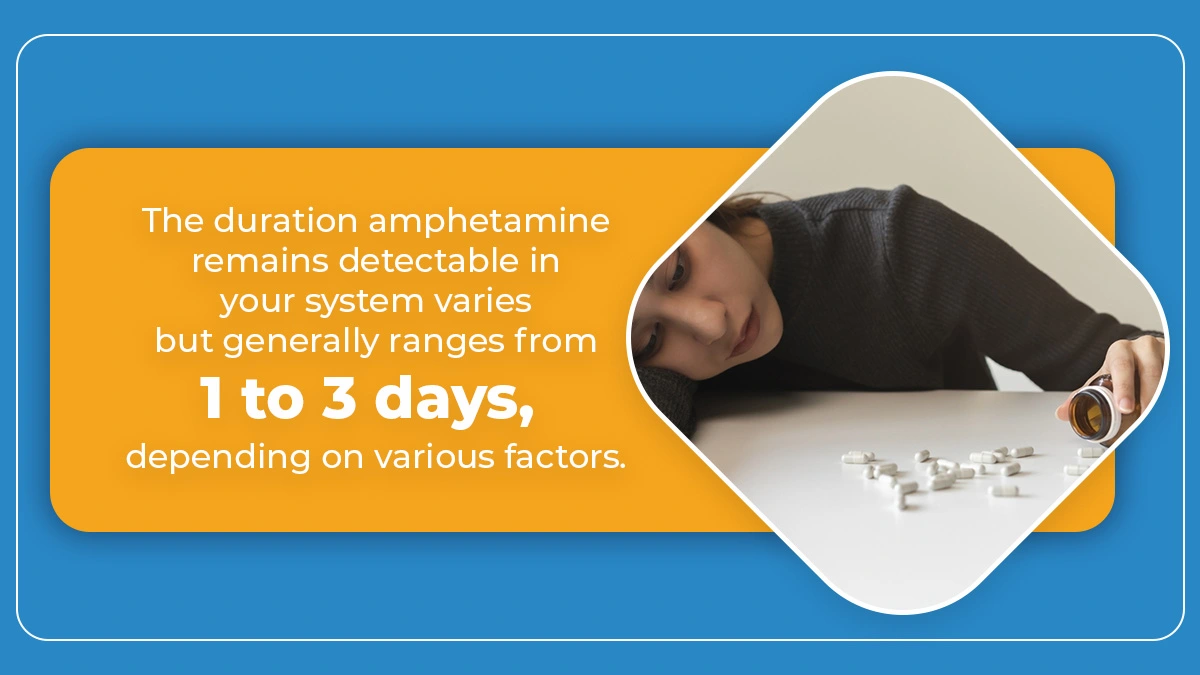How Long Does Amphetamine Last in Your System
Amphetamine is a type of stimulant drug often used in treating attention deficit hyperactivity disorder (ADHD) and narcolepsy. It works by boosting certain chemicals in the brain to enhance focus, alertness, and energy. This substance is also sometimes abused for its euphoric effects.
When discussing how long amphetamine stays in your system, it’s essential to note that the duration varies based on several factors. Understanding these influencing factors is vital, especially for those undergoing drug screenings for employment or medical purposes.
Key Takeaways
Amphetamines are central nervous system stimulants, often used for conditions like ADHD. Here is what you need to know about their stay in your body:
- Various drug tests can be used to detect amphetamines, with detection windows varying based on the test type.
- The duration amphetamines stay in the system depends on factors like dosage, frequency of use, and metabolism.
- Amphetamine withdrawal symptoms can start within hours to days after stopping use and may last for weeks.
Ready to overcome substance use disorder (SUD)? Contact The Recovery Team at (800) 817-1247 to explore effective treatment programs for lasting recovery.
What Are Amphetamines
Amphetamines are a class of powerful stimulant medications that affect the central nervous system (CNS). They can come in various forms, including prescription medications like Adderall, used to treat attention deficit hyperactivity disorder (ADHD) and narcolepsy, as well as illegal amphetamines like methamphetamine.
When taken, amphetamines increase the release of certain neurotransmitters in the brain, particularly dopamine and norepinephrine. This action leads to heightened alertness, increased concentration, elevated mood, and a sense of increased energy.
Physical effects of amphetamines might include increased heart rate and blood pressure, suppressed appetite, and increased wakefulness. At higher doses or with use regularly, these drugs can lead to serious health issues like cardiovascular problems, insomnia, seizures, and even psychosis.
Psychologically, amphetamines can produce a feeling of euphoria, increased motivation, and a sense of heightened focus. However, they can also lead to agitation, anxiety, and, in some cases, paranoia or hallucinations. Misuse or abuse can result in amphetamine addiction and severe mental health conditions.
When taken under medical supervision and as prescribed, amphetamines can be effective in managing specific conditions. However, when used recreationally or without a prescription, they pose substantial risks to both physical and mental health. It’s crucial to use them only as directed by a healthcare provider.
Drug Testing for Amphetamine Detection
Drug tests can detect the presence of amphetamines in various ways, typically through biological samples like urine, blood, saliva, or hair. Here’s an overview of some common drug testing methods:
Urine Tests
Urine drug test is the most common method for detecting amphetamines. They can identify the presence of the drug or its metabolites in the urine. Amphetamines can usually be detected in urine for up to four days after use.
Blood Tests
Blood tests can detect amphetamines for a shorter period compared to urine tests, generally around 12-24 hours after the last dose. They are often used in situations where recent drug use needs to be confirmed quickly.
Saliva Tests
Saliva tests are non-invasive and can detect amphetamines for a shorter window of time compared to urine tests, usually within one to four days after last use. They are gaining popularity due to ease of administration and their ability to detect recent drug use.
Hair Tests
Hair follicle tests can detect a longer history of drug use compared to other methods. They can show amphetamine use for up to 90 days after consumption, as the drug or its metabolites get incorporated into the hair follicles as the hair grows.
The accuracy and reliability of these tests can vary, and false positives or negatives are possible. Factors such as the sensitivity of the test, the specific amphetamine used, the dose, frequency of use, and individual metabolism can influence the results.
Factors Affecting Amphetamine Duration
The duration amphetamines stay in your system based on several influencing factors. These factors vary from person to person and may include:
Dosage and Frequency of Use
The amount and how often someone uses amphetamines directly impact how long it stays in their system. Higher doses and more frequent use can extend the detection window in drug tests, as it takes longer for the body to process and eliminate the substance.
Individual Metabolism
Each person’s body metabolizes substances differently. Factors such as age, genetics, weight, and overall health can affect how quickly the body processes and eliminates amphetamines. Individuals with faster metabolism may clear the drugs from their system more rapidly.
Hydration Level
Staying hydrated can influence how long amphetamines are detectable. Proper hydration supports the body’s natural detoxification process, potentially aiding in faster drug elimination.
Type of Amphetamine
Different formulations of amphetamines, such as extended-release versus immediate-release versions, can affect how long the drug remains detectable. Extended-release formulations, like Adderall XR, may have a longer duration of action and detection.
Chronic Use vs. Occasional Use
Regular or chronic use of amphetamines can lead to accumulation in the body, prolonging its detection. On the other hand, occasional use might result in quicker elimination.
Co-Occurring Substance Use
Using other substances alongside amphetamines can impact its metabolism and elimination. Some substances might interact, either speeding up or slowing down the body’s ability to process amphetamines.
Amphetamine Withdrawal
Amphetamine withdrawal refers to the set of symptoms that occur when someone who has been using amphetamines regularly suddenly stops or significantly reduces their intake. The withdrawal phase can be challenging, varying in intensity and duration.
Withdrawal Symptoms
The withdrawal symptoms associated with amphetamine withdrawal can include:
- Cravings: Intense desires for the drug.
- Fatigue: Extreme tiredness and lack of energy.
- Increased Appetite: Some people may experience an increase in appetite.
- Depression: Feelings of sadness and despair.
- Irritability: Easily irritated or annoyed.
- Anxiety: Persistent worry or fear.
- Sleep Disturbances: Insomnia or hypersomnia (excessive sleep).
- Psychomotor Retardation: Slowed physical and mental processes.
- Difficulty Concentrating: Problems with focus and attention.
- Increased REM Sleep: Vivid dreams and nightmares.
These symptoms can vary in intensity and duration depending on factors such as the individual’s overall health, the extent of substance abuse, and the presence of any co-occurring mental illness.
Duration of Withdrawal
The withdrawal period for amphetamines typically follows a general length of time, but it can vary. The acute withdrawal phase may last a few days to a couple of weeks, during which the most intense symptoms are experienced. However, some residual symptoms may persist for several weeks or even months.
Acute Phase (First Few Days to Weeks): This is when the most severe symptoms occur. Individuals may experience intense cravings, fatigue, irritability, and mood swings.
Post-Acute Withdrawal Syndrome (PAWS): After the acute phase, some people may continue to experience lingering symptoms such as depression, anxiety, and difficulty concentrating. This phase can last for weeks to months.
It’s important to note that withdrawal experiences are highly individual, and some individuals may not experience all of the symptoms listed. In addition, seeking support from doctors, medical professionals, therapists, or support groups can be beneficial during withdrawal.
The Recovery Team, Where Every Step Leads to Triumph
Embark on your journey to addiction recovery with The Recovery Team, where compassionate care meets effective treatment. Our comprehensive programs, including partial hospitalization and residential treatment, are tailored to guide you toward lasting healing.
Experience evidence-based therapies such as CBT and Relapse Prevention Therapy, carefully designed to address your unique needs. Our commitment extends beyond addiction, encompassing mental health services that foster holistic well-being.
Choose a path to transformation, and let us support you. Take the first step today by contacting us at (800) 817-1247, where hope and healing converge for a healthier tomorrow.






